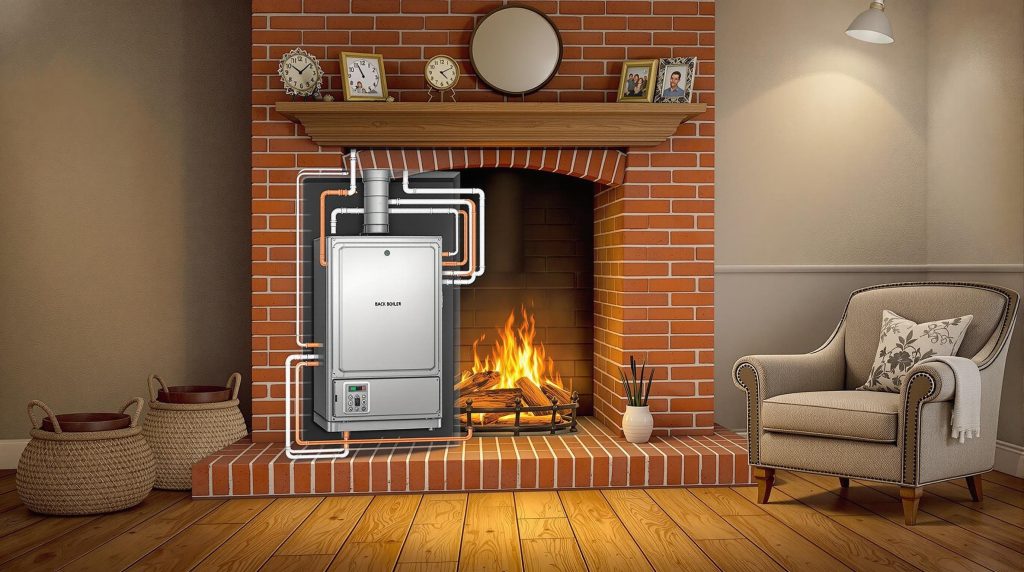What are Back Boilers and Why Should They Be Replaced?
Back boilers were once a common sight in UK homes. Typically installed behind a fireplace, these older-style boilers used the heat from the fire to warm both water and living spaces. Back boilers are now considered outdated and inefficient. If you are looking to replace your back boiler with a more energy efficient heating and hot water system then you could qualify for a back boiler removal grant.
Reasons to replace your back boiler
- Back boilers use excessive energy consumption, leading to significantly higher energy bills.
- Safety Risks: An old, neglected back boiler can pose serious safety hazards to you and your family. Cracks, corrosion, and improper maintenance can increase the risk of carbon monoxide leaks, a silent and deadly threat. Additionally, the high temperatures associated with back boilers can heighten the risk of fire hazards.
- Environmental Impact: Back boilers are major contributors to carbon emissions due to their heavy reliance on fossil fuels.
- Repair Difficulties: Finding qualified technicians to repair an aging back boiler can be a challenging and costly endeavor.
- Difficulty finding parts: As these systems become increasingly obsolete, spare parts become scarce and specialized expertise dwindles, leaving homeowners with limited and expensive repair options.
- Financial savings: Switching to a modern heating system can save you up to £300 per year on energy bills due to improved efficiency and lower fuel consumption.
- Enhanced energy efficiency: New heating systems offer higher energy efficiency ratings, which means reduced energy consumption. For instance, modern condensing boilers are typically over 90% efficient, while older back boilers can be as low as 60% efficient.
- Improved heating performance: Modern boilers provide better heat output, ensuring a consistent and comfortable indoor temperature throughout your home.
- Eco-friendly solution: Upgrading from a back boiler to a modern condensing boiler can reduce carbon dioxide emissions by around 1.7 tonnes per year for an average home.
- Increased property value: For homeowners, upgrading your heating system adds value to the property, making it more attractive to potential buyers.
Modern boilers provide improved heating performance and allow you to embrace eco-friendly solutions and reduce your carbon footprint. By upgrading to a more energy-efficient system, you can reduce energy consumption, lower your utility bills, and contribute to a greener environment.
Government Grants to replace your back boiler
The UK government recognizes the need to upgrade outdated heating systems and offers financial assistance to make the transition easier. Several government-funded schemes are available to help homeowners replace their inefficient back boilers with modern, energy-saving alternatives:
- ECO4 Scheme: The Energy Company Obligation (ECO4) scheme is a government initiative that obligates energy suppliers to fund energy efficiency improvements in UK homes. It’s one of the primary sources of funding for back boiler removal and replacement, often covering the entire cost of the upgrade for eligible homeowners.
Eligibility for ECO4:
ECO4 has three eligibility groups:
Help to Heat Group:
To qualify, you must:
- Own your home or rent privately
- Be considered a low-income household
- Have a home with an EPC rating of D or below
- Receive at least one of the listed means-tested benefits
- Child Benefit
- Child Tax Credit
- Income-Based Jobseekers Allowance
- Income-Related Employment Support Allowance
- Income Support
- Pension Guarantee Credit
- Universal Credit
- Working Tax Credit
- Housing Benefit
- Pension Credit Savings Credit
Social Housing Group:
This group is specifically for residents of social housing. You might qualify if:
- Your home is let below market rate
- Your property has an EPC rating of D-G
- Your home does not meet the Minimum Insulation Requirements
ECO Flex Group:
This group is for individuals who might not fit into the other categories. Eligibility is determined by Local Authorities based on localized criteria. This could include factors like:
- Household income below £31,000 and an EPC rating of D-G
- Vulnerability to living in a cold home due to health conditions
How to check your Energy Performance Certificate (EPC)
To check your eligibility for a cavity wall insulation grant, follow these steps:
1. Access the EPC register online:
- For properties in England and Wales, click here to access the EPC Register
- For properties in Scotland, use the Scottish EPC register
2. Enter your property’s postcode and select your address from the list provided.
3. View and download your EPC report.
Once you have accessed your EPC, look for the following information:
Wall Construction and Insulation Status
Your EPC should indicate:
- The type of walls your property has (cavity or solid)
- Whether cavity walls have been previously filled
If your property has cavity walls that are not insulated, you may be eligible for a cavity wall insulation grant.
Check your Energy Efficiency Rating
Check your home’s current energy efficiency rating on your EPC, which ranges from A (most efficient) to G (least efficient). Properties with ratings of D to G may be eligible for support under schemes like the Great British Insulation Scheme
Check your properties Council tax Band
To check your council tax band for eligibility for a cavity wall insulation grant, follow these steps:
- For properties in England and Wales, visit the official government website to check your council tax band
- For properties in Scotland, visit the Scottish council tax band checker
Key facts about the back boiler removal grant
The back boiler removal grant is a government-funded program that aims to encourage homeowners to replace their outdated back boilers with more energy-efficient heating systems. Here are some key facts about the program:
- Eligibility: The grant is available to homeowners in England, Scotland, and Wales whose homes have low energy efficiency ratings. This is often the case in homes with back boilers. To be eligible for funding, someone living at the property must meet one of the qualifying factors. These factors include receiving benefits, meeting income rules, having a health issue, or being considered vulnerable.
- Financial Support: The grant typically covers 100% of the costs to remove the back boiler and install a new energy-efficient heating system, such as a mains gas boiler or a heat pump. The amount of funding may vary based on location, individual circumstances, and the property. Homeowners may also qualify to have insulation installed for free as part of the grant package.
- Government-Backed: This grant is part of the government’s Energy Company Obligation (ECO) scheme. The scheme has £4 billion available to upgrade inefficient homes across the UK. The ECO4 phase of the scheme, which includes back boiler removal grants, aims to achieve annual cost savings of £224.3 million for households through home-heating cost reductions by March 31, 2026.
- Uptake: As of June 2024, 39,929 households have benefitted from the “Boiler – Upgrade of an inefficient heating system” measures implemented in the ECO4 phase, demonstrating the program’s impact and success.
The Energy Saving Genie website states that these grants will end once energy companies have met their legal obligations, so interested homeowners should apply soon.
Back Boiler Removal Grants: Your Questions Answered
Back Boiler Basics:
-
What is a back boiler?
A back boiler is an older type of boiler commonly installed behind a fireplace in UK homes. It uses heat from the fire to warm water for both domestic use and central heating.
-
Why are back boilers inefficient?
Back boilers are considered inefficient due to their outdated design, reliance on fossil fuels, and high levels of heat loss. This inefficiency leads to increased energy consumption and higher heating costs.
-
Are back boilers dangerous?
Yes, old back boilers can be dangerous. They pose risks of carbon monoxide leaks, fire hazards due to high temperatures, and potential explosions if not properly maintained.
Grant Programs and Eligibility:
-
Are there grants to help replace my back boiler?
Yes, the UK government offers financial assistance through schemes like the ECO4 scheme, which can cover the cost of removing your old back boiler and installing a modern, energy-efficient replacement.
-
Who is eligible for a back boiler removal grant?
You might be eligible if you meet certain criteria, including:
- Owning your home. Tenants are typically not eligible.
- Having a back boiler installed before a certain year, often 2005.
- A low Energy Performance Certificate (EPC) rating, such as E, F, or G.
- Receiving certain income-related benefits like Pension Credit, Universal Credit, or Income Support.
Boiler Replacement Options:
-
What types of boilers can replace my back boiler?
You have several options, including:
- Combi Boilers: Heat water on demand, saving space and ideal for smaller to medium homes.
- System Boilers: Heat water and store it in a cylinder, suitable for larger homes with higher hot water demands.
- Regular Boilers: Traditional systems with a hot water cylinder and cold water tank, suitable for large homes with high hot water needs.
- Low-carbon systems: Like heat pumps, biomass boilers, and solar panels, which offer eco-friendly alternatives.
Costs and Savings:
-
How much does back boiler replacement cost?
Without a grant, back boiler replacement can cost between £900 to £5,000 or more, depending on the complexity of the removal, the new boiler type, and additional work.
-
What is the difference between decommissioning and removing a back boiler?
Decommissioning disconnects the boiler, rendering it inoperable but leaving it in place. Removal physically takes the boiler out. Decommissioning is cheaper but may not be suitable for all replacements.
-
How much can I save on energy bills with a new boiler?
A modern, energy-efficient boiler can save you hundreds of pounds annually on your heating costs compared to an old back boiler.
Additional Considerations:
-
What are the benefits of replacing my back boiler besides cost savings?
Back boiler replacement also:
- Increases property value
- Reduces your carbon footprint
- Improves home safety by eliminating risks associated with old boilers
-
What happens after I apply for a grant?
A registered installer will visit your home to assess your needs and property. If approved, they will schedule the removal of your old back boiler and install the new one.






